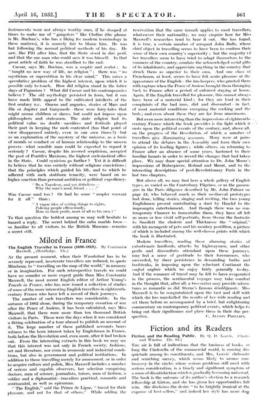Milord in France
The English Traveller In France (1698-1815). By Constantin Maxwell. (Routledge. 15s.) AT the present moment, when their Wanderlust has to be severely repressed, inveterate travellers are reduced, to quote Mintbeau, to " travelling on the map of the world," in memory or in imagination. For such retrospective travels we could have no sounder or more expert guide than Miss Constantia Maxwell, the most recent English editor of Arthur Young's Travels in France, who has now issued a collection of studies of some of the more interesting English travellers in eighteenth- century France who have left a record of their journeys.
The number of such travellers was considerable. In the autumn of 1802 alone, during the temporary cessation of war after the Peace of Amiens, it has been calculated, says Miss Maxwell, that there were more than ten thousand British visitors in Paris. Those were the days when it was considered a fitting celebration of a tour abroad to publish an account of it. The large number of these published accounts bears witness to the keen interest taken by Englishmen in France, both before the Revolution and, even more, after it had broken out. From the interesting extracts in this book we may Nee that this interest was not only in French society, fashions, art and literature, nor even in economic and industrial condi- tions, but also in government and political institutions. In addition to those travelling merely for amusement, or in order to acquire culture and polish, Miss Maxwell includes a number of serious and capable observers, her selection comprising doctors, men of science, journalists, tutors, men of fashion, a soldier and a diplomatist—travellers praetical, romantic and sentimental, as well as epicurean.
The English," said the Prince de Ligne, "travel for their pleasure, and not for that of others." While adding the reservation that the same remark applies to most travellers; whatsoever their nationality, we may enquire how far Miss Maxwell's researches tend to bear it out. She has found, it is true, a certain number of arrogant John Bulls, whose chief object in travelling seems to have been to confirm their sense of their own country's superiority ; but the majority %if her travellers seem to have tried to adapt themselves to the manners of the country, emulate the acknowledged social gifts of its inhabitants, and appreciate anything in the country that struck them as superior to their OW11. And 011C class of Frenchmen, at least, seems to have felt acute pleasurc at the appearance of the English- - the inn-keepers, who greeted then) wit li rapture when the Peace of Amiens brought them thronging hack to France after a period of enforced staying at home. Again, if the English travelled for pleasure, this cannot always have been of a material kind ; for they are loud in their complaints of the bad inns, dirt and discomfort—in fact, of most material conditions excepting the cooking and the beds ; and even about these they are far from unanimous. - But even more interesting than the impressions of eighteenth century France which the book pros-ides is the light which it casts upon the political events of the century, and, above all on the progress of the Revolution, of which a number of travellers give illuminating accounts. Many were at pains to attend the debates in the Assembly and form their own opinion of its leading figures ; while others, on returning to France sifter an absence of some years, hastened to their familiar haunts in order to record the changes that had taken place. We may draw special attention to Dr. John Moore's impressions of Robespierre, Roland and Maim-at, and to the interesting descriptions of post-Revolutionary Paris in the last two chapters.
But above all, we may find here a whole gallery of English types, as varied as the Canterbury Pilgrims, or us the passen- gers in the Paris diligence described by Mr. John Palmer on page 24, who behaved flinch as their mediaeval prototypes had done, telling stories, singing and reciting, the two young Englishmen present contributing a duet by Hamlet to the impromptu entertainment. And though there was no con- temporary Chaucer to immortalize them, they have all left us more or less vivid self-portraits, from Sterne the fantastie to Smollett the choleric and Thieknesse the "original," with his menagerie of pets anal his monkey postillion, a picture of which is included among the well-chosen prints with which the book is illustrated.
Modern travellers, reading these alarming stories of ektortionate landlords, attacks by highwaymen, and other perils and discomforts attendant upon these journeys, may feel a sense of gratitude to their forerunners, who succeeded, by sheer persistence in demanding baths and beefsteaks, in imposing upon the reluctant Continent the conforl anglais which we enjoy fairly generally to-day. And if the romance of travel may be felt to have evaporated in the process, the sentimental voyager may take comfort in the thought that, after all, a two-seater may provide adven- tures as romantic as did Sterne's famous Wsoldigeante. Miss Maxwell is to be congratulated npon the tact and skill with which she has marshalled the results of her wide reading and set them before us accompanied by a brief, but enlightening commentary on contemporary political events, which helps to bring out their significance and place them in their due per-








































 Previous page
Previous page